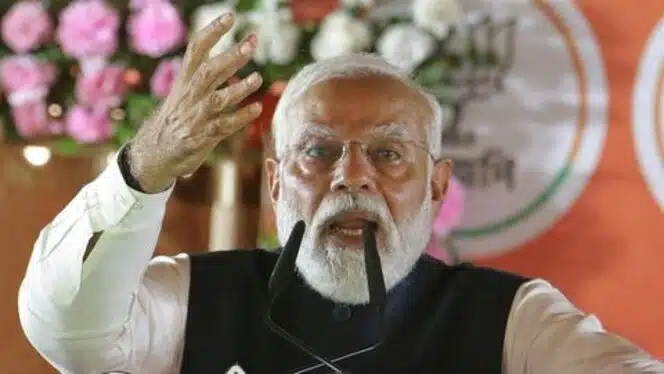The right-wing BJP’s spokeswoman defends Prime Minister Modi’s use of the term “a spade a spade,” while the Congress, the opposition party, claims that Modi’s comments were “far worse than any sitting PM, in the history of India.”
Hindu nationalist Prime Minister Narendra Modi is accused in a complaint by India’s main opposition Congress party of “blatantly targeting” minority Muslims during a campaign address. The complaint was submitted to the country’s Election Commission.
The Congress party said that the “divisive, objectionable and malicious” remarks were directed towards “a particular religious community” and constituted “blatant and direct violations of electoral laws” in its complaint filed with the Election Commission on Monday.
According to the lawsuit, they were “far worse than any ever made by a sitting Prime Minister in the history of India”.
Outside the Commission’s office, Congress party spokesperson Abhishek Manu Singhvi said to reporters, “We hope concrete action will be taken.”
Modi, who is running for an uncommon third term in office, drew harsh criticism from opposition parties and human rights organizations on Sunday when he called Muslims “infiltrators” and “baby producers” during a campaign address.
Modi made up the assertion that “Muslims have the first right over the nation’s wealth” was made by a previous congress administration.
“It will be distributed among those who have more children [Muslims],” he declared if Congress wins. It is going to be given to the spies.”
Do you believe infiltrators should receive your hard-earned money? Would you agree to this?” The statements were criticized for making references to Muslims.
Though Modi is the third oldest of six siblings, having been born on September 17, 1950 to Damodardas Mulchand Modi and Heeraben Modi, his ruling Bharatiya Janata Party [and now the PM himself] has erroneously claimed on numerous occasions that Muslims had higher birth rates.
attacking opponents and Muslims
Election laws grant the Election Commission the authority to request a response from a party or its leader, to issue advisories warning them off or preventing them from campaigning for a predetermined amount of time, or to file a criminal complaint against repeat offenders.
With the lengthy elections starting last Friday and the results not anticipated until June 4, Modi and his BJP are predicted to easily win.
Modi oversaw the opening of a large temple dedicated to the god Ram earlier this year. The temple was constructed on the site of a centuries-old mosque that was destroyed by radical Hindus.
During the campaign road, the BJP has made repeated references to the shrine.
On Monday, BJP spokesman Gaurav Bhatia informed reporters that Modi was using language that was “a spade a spade” and that people found his comments to be meaningful.
The Bharatiya Janata Party (BJP) and its radical affiliates have chastised Muslims for having more children and conjured up the unfounded fear that Muslims will surpass Hindus as the country’s predominant population.
Of the 1.42 billion people living in India, almost 80% are Hindus. After Indonesia and Pakistan, the estimated 200 million Muslims worldwide make up the third-largest Muslim population.
For a long time, observers predicted that Modi would win over a divided coalition of over twenty parties that have not yet selected a prime minister.
The fact that his opponents are the subject of multiple criminal investigations and that Congress’s bank accounts were frozen during this year’s tax probe have improved his chances even further.
India has surpassed Britain, the old colonial master, to become the world’s fifth-largest economy under Modi’s leadership, and Western countries are lining up to seek a potential ally against China, a rival nation in the region.
Under his leadership, there have been lynchings and other egregious acts of hate speech directed towards Muslims in particular. Critics claim that as threats to the press, political rivals, and judiciary mount, India’s democracy is collapsing. Furthermore, Modi has made it harder to distinguish between the state and religion.
SOURCE: TRTWORLD






